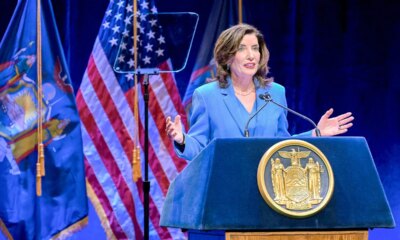LOS ANGELES (AP) — In the arid, cracked desert ground in Southern California, a tiny bee pokes its head out of a hole no larger than the tip of a crayon.
Krystle Hickman crouches over with her specialized camera fitted to capture the minute details of the bee’s antennae and fuzzy behind.
“Oh my gosh, you are so cute,” Hickman murmurs before the female sweat bee flies away.
Hickman is on a quest to document hundreds of species of native bees, which are under threat by climate change and habitat loss, some of it caused by the more recognizable and agriculturally valued honey bee — an invasive species. Of the roughly 4,000 types of bees native to North America, Hickman has photographed over 300. For about 20 of them, she’s the first to ever photograph them alive.
Through photography, she wants to raise awareness about the importance of native bees to the survival of the flora and fauna around them.
“Saving the bees means saving their entire ecosystems,” Hickman said.
Community scientists play important role in observing bees
On a Saturday in January, Hickman walked among the early wildflower bloom at Anza Borrego Desert State Park a few hundred miles east of Los Angeles, where clumps of purple verbena and patches of white primrose were blooming unusually early due to a wet winter.
Where there are flowers, there are bees.
Hickman has no formal science education and dropped out of a business program that she hated. But her passion for bees and keen observation skills made her a good community scientist, she said. In October, she published a book documenting California’s native bees, partly supported by National Geographic. She’s conducted research supported by the University of California, Irvine, and hopes to publish research notes this year on some of her discoveries.
“We’re filling in a lot of gaps,” she said of the role community scientists play in contributing knowledge alongside academics.
On a given day, she might spend 16 hours waiting beside a plant, watching as bees wake up and go about their business. They pay her no attention.
Originally from Nebraska, Hickman moved to Los Angeles to pursue acting. She began photographing honey bees in 2018, but soon realized native bees were in greater danger.
Now, she’s a bee scientist full time.
“I really think anyone could do this,” Hickman said.
A different approach
Melittologists, or people who study bees, have traditionally used pan trapping to collect and examine dead bee specimens. To officially log a new species, scientists usually must submit several bees to labs, Hickman said.
There can be small anatomical differences between species that can’t be photographed, such as the underside of a bee, Hickman said.
But Hickman is vehemently against capturing bees. She worries about harming already threatened species. Unofficially, she thinks she’s photographed at least four previously undescribed species.
Hickman said she’s angered “a few melittologists before because I won’t tell them where things are.”
Her approach has helped her forge a path as a bee behavior expert.
During her trip to Anza Borrego, Hickman noted that the bees won’t emerge from their hideouts until around 10 a.m., when the desert begins to heat up. They generally spend 20 minutes foraging and 10 minutes back in their burrows to offload pollen, she said.
“It’s really shockingly easy to make new behavioral discoveries just because no one’s looking at insects alive,” she said.
Hickman still works closely with other melittologists, often sending them photos for identification and discussing research ideas.
Christine Wilkinson, assistant curator of community science at the Natural History Museum in Los Angeles, said Hickman was a perfect example of why it’s important to incorporate different perspectives in the pursuit of scientific knowledge.
“There are so many different ways of knowing and relating to the world,” Wilkinson said. “Getting engaged as a community scientist can also get people interested in and passionate about really making change.”
Declining native bees
There’s a critically endangered bee that Hickman is particularly determined to find – Bombus franklini, or Franklin’s bumblebee, last seen in 2006.
Since 2021, she’s traveled annually to the Oregon-California border to look for it.
“There’s quite a few people who think it’s extinct, but I’m being really optimistic about it,” she said.
Habitat loss, as well as competition from honey bees, have made it harder for native bees to survive. Many native bees will only drink the nectar or eat the pollen of a specific plant.
Because of her success in tracking down bees, she’s now working with various universities and community groups to help find lost species, which are bees that haven’t been documented in the wild for at least a decade.
Hickman often finds herself explaining to audiences why native bees are important. They don’t make honey, and the disappearance of a few bees might not have an apparent impact on humans.
“But things that live here, they deserve to live here. And that should be a good enough reason to protect them,” she said.








































